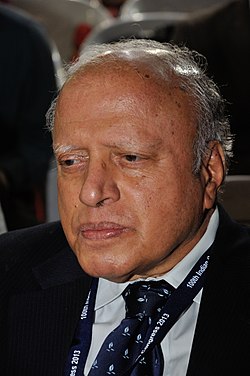M. S. Swaminathan
| M. S. Swaminathan | |
|---|---|

Swaminathan at the 100th Indian Science Congress
|
|
| Born |
7 August 1925 Kumbakonam Madras Presidency |
| Residence | Chennai, Tamil Nadu, India |
| Institutions | MS Swaminathan Research Foundation |
| Alma mater |
H H M University College Thiruvananthapuram Tamil Nadu Agricultural University Fitzwilliam College, Cambridge University of Wisconsin-Madison |
| Known for | High-yielding varieties of wheat in India |
| Influences | Dr. Norman Borlaug |
| Notable awards | Padma Shri (1967) Ramon Magsaysay (1971) Padma Bhushan (1972) Albert Einstein World Award of Science (1986) Padma Vibhushan (1989) World Food Prize (1987) Tyler Prize for Environmental Achievement (1991) Volvo Environment Prize (1999) Indira Gandhi Peace Prize(1999) Indira Gandhi Award for National Integration (2013) |
| Spouse | Mina Swaminathan |
| Children | Soumya Swaminathan |
Mankombu Sambasivan Swaminathan (born 7 August 1925) is an Indian geneticist and international administrator, renowned for his leading role in India's Green Revolution a program under which high-yield varieties of wheat and rice seedlings were planted in the fields of poor farmers. Swaminathan is known as "Indian Father of Green Revolution" for his leadership and success in introducing and further developing high-yielding varieties of wheat in India. He is the founder and chairman of the MS Swaminathan Research Foundation. His stated vision is to rid the world of hunger and poverty. Swaminathan is an advocate of moving India to sustainable development, especially using environmentally sustainable agriculture, sustainable food security and the preservation of biodiversity, which he calls an "evergreen revolution."
From 1972 to 1979 he was director general of the Indian Council of Agricultural Research. He was Principal Secretary, Ministry of Agriculture from 1979 to 1980. He served as Director General of the International Rice Research Institute (1982–88) and became president of the International Union for the Conservation of Nature and Natural Resources in 1988.
In 1999, Time magazine placed him in the 'Time 20' list of most influential Asian people of the 20th century.
M. S. Swaminathan was born in Kumbakonam on 7 August 1925. He was the second son of surgeon Dr. M.K. Sambasivan and Parvati Thangammal Sambasivan. M.S. Swaminathan learnt from his father, "that the word 'impossible' exists mainly in our minds and that given the requisite will and effort, great tasks can be accomplished." Surgeon M.K. Sambasivam, a follower of Mahatma Gandhi, took the lead in Kumbakonam in "burning his foreign clothes," a symbolic act in support of the Swadeshi movement: which emphasized the use of Indian rather than foreign-made clothes, and handloomed rather than mill-spun cloth. The political purpose of the swadeshi movement was to free India from dependence on foreign imports and to protect village industry. His father led in opening the temples to Dalits, part of the temple entry movement of the Indian independence movement in Tamil Nadu, and in eradicating filariasis in Kumbakonom, an area long infected with the dread disease. The sense of service to one's fellow man was thus ingrained in him early.
...
Wikipedia
